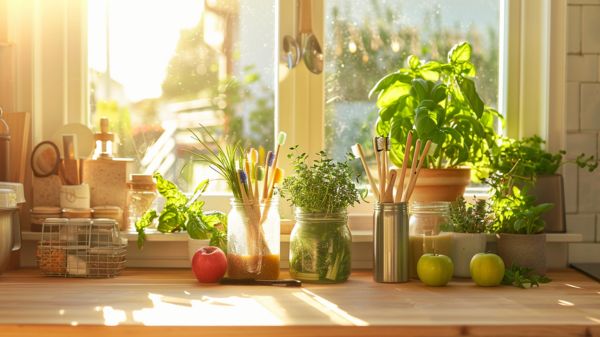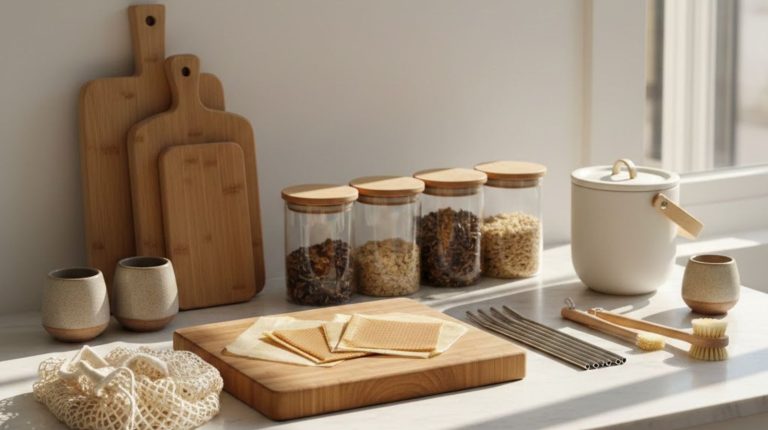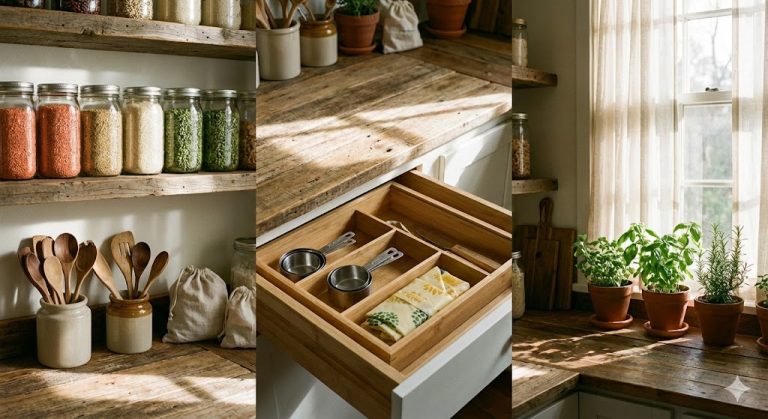To embrace a sustainable lifestyle through zero waste initiatives, you should consider implementing ten effective swaps, which include opting for reusable water bottles, bamboo toothbrushes, glass food storage containers, and soap bars, thereby greatly reducing plastic waste. Additionally, using reusable tote bags, energy-efficient LED light bulbs, and sourcing clothing from thrift stores can lower your environmental impact.
Furthermore, shifting to loofah sponges and practicing effective composting techniques will further enhance your eco-friendly practices. Each of these changes contributes to waste reduction, resource conservation, and improved community engagement, providing a thorough framework for sustainable living that you might find insightful.
Reusable Water Bottles
Reusable water bottles are a game-changer for anyone aiming to adopt a sustainable lifestyle. By opting for these eco-friendly alternatives, you not only save money—potentially up to $6,180 over five years—but also contribute greatly towards reducing environmental pollution.
With an estimated 156 plastic bottles prevented from entering the ocean yearly per person, your choice of water bottle materials can make a profound impact. For instance, bottles made from stainless steel or BPA-free plastics aren’t only safer for your health but also minimize harmful leaching. Additionally, it’s important to note that only 23% of plastic water bottles purchased in the U.S. are recycled, underscoring the significance of using reusable options.
Incorporating reusable water bottles into your daily routine improves hydration habits, encouraging you to drink more water while decreasing your reliance on single-use plastics.
The environmental benefits are staggering; using these bottles reduces energy consumption by 85% compared to traditional bottled water and cuts down greenhouse gas emissions by nearly 79%.
Moreover, every time you refill your reusable bottle, you’re actively decreasing the 50 million plastic bottles used annually in the U.S., many of which languish in landfills or pollute waterways.
Bamboo Toothbrushes
Choosing bamboo toothbrushes is a simple yet effective way to reduce your environmental footprint. Unlike traditional plastic options, bamboo toothbrushes utilize biodegradable materials that not only decompose naturally but also greatly cut down on plastic waste, contributing to the mitigation of pollution in our landfills and oceans. The production of traditional plastic toothbrushes, which is heavily reliant on fossil fuels, exacerbates environmental issues.
With sustainable bamboo sourcing practices, which involve organic farming methods that forgo pesticides and fertilizers, the production process boasts a considerably lower environmental impact compared to conventional plastics.
The toothbrush lifecycle of bamboo products showcases their environmental advantages, from cultivation, which demands less water and energy, to disposal, where bamboo handles can seamlessly integrate into composting systems, promoting sustainability.
In addition, it’s vital to evaluate the broader implications of bamboo farming, which supports local economies and enhances social welfare in economically challenged regions. However, awareness regarding the non-recyclable components, particularly nylon bristles, is imperative. Raising this awareness equips consumers with the knowledge needed to make informed and responsible choices, ultimately fostering a community oriented towards sustainability.
Glass Food Storage Containers
Embracing sustainability in your kitchen can be as straightforward as switching to glass food storage containers. These containers offer numerous glass container benefits, making them a compelling choice for eco-friendly storage.
Unlike plastic, glass is non-toxic and free from harmful chemicals like BPA and phthalates, ensuring your food remains pure and flavorful without any after-tastes. Their nonporous nature prevents odor absorption, meaning your meals maintain their intended flavors. Additionally, glass containers are resistant to breaking and provide a sturdy feel, making them a reliable choice for everyday use.
Additionally, glass storage containers excel in durability and recyclability, considerably reducing landfill contributions associated with disposable plastics. When you invest in these sustainable alternatives, you’re opting for long-term savings; with proper care, they can last for years and remain resistant to stains and odors.
These containers can endure a range of temperatures, making them suitable for baking, microwaving, and freezing. Their airtight seals further enhance food preservation, locking in freshness and nutritional value.
No products found.
Soap Bars
When considering a sustainable lifestyle, incorporating soap bars into your routine offers significant environmental benefits, including reduced packaging waste and lower carbon emissions.
To select the right soap, focus on options made from sustainable ingredients, and actively support small businesses engaged in eco-friendly practices. Additionally, experimenting with bar soap can further enhance your commitment to zero waste while allowing you to tailor products to your preferences.
Environmental Benefits of Soap Bars
Soap bars offer notable environmental benefits that make them a smart choice for eco-conscious consumers. First and foremost, the minimal or plastic-free packaging of bar soaps contributes to a substantial reduction in packaging waste, considerably lessening your environmental footprint.
Unlike liquid soaps, which are often encased in plastic containers, bar soaps use biodegradable packaging, aligning with sustainable ingredient practices that prioritize the planet’s health.
From a manufacturing perspective, bar soaps require considerably less water than their liquid counterparts, utilizing only about 12-14% water, compared to the 80-90% found in typical body washes.
This not only conserves precious water resources but also means that bar soap has a smaller carbon footprint due to lower production-related environmental impacts, such as acidification and global warming potential.
Furthermore, because bar soaps are cost-effective, they can help reduce overall consumer purchasing frequency, thus minimizing the environmental impact of repeated production and shipping.
Moreover, as bar soaps tend to last longer and contain no preservatives, their use minimizes chemical feedstocks, which can pollute marine ecosystems.
Choosing bar soap ultimately supports a sustainable lifestyle, enabling you to join a community of like-minded individuals committed to environmental stewardship while promoting a cleaner, healthier planet for everyone.
Choosing the Right Soap
In the quest for a sustainable lifestyle, choosing the right soap bar can make a significant difference. When selecting a soap bar, you should prioritize options that feature sustainable ingredients, ensuring you support eco-friendly practices.
Brands like Ethique and Friendly Soap provide all-natural, plant-based formulas devoid of synthetic fragrances, appealing to both your commitment to the environment and personal care.
Additionally, consider the packaging of the soap bar. Opt for those with eco-friendly packaging, such as 100% recycled and recyclable materials, which brands like Friendly Soap offer. This minimizes additional waste while supporting a circular economy.
Also, look for brands that practice fair trade, like Ethique, which guarantees fair payment to farmers, reinforcing a community-focused approach. By choosing these products, you not only enjoy the benefits of soap bars—such as longer-lasting use and reduced water consumption—but also foster a sense of belonging to a movement dedicated to sustainability.
Finally, remember that many small businesses create quality soap bars, contributing to local economies and reflecting the power of your purchasing decisions. By making these thoughtful choices, you’re joining a community committed to a zero-waste future.
Simple DIY Soap Recipes
Crafting your own soap bars offers a fun and rewarding way to support a sustainable lifestyle. Using the melt and pour soap making technique simplifies the process, requiring only a few natural ingredients like melt and pour soap base, oat flour, pink clay, raw honey, and jojoba oil.
Begin by heating the soap base over medium heat until completely melted. If you don’t have a mold, a loaf pan lined with parchment paper works just fine. Once melted, you can personalize your soap by adding oat flour for its soothing properties and pink clay for detoxification, along with raw honey for moisture.
Consider incorporating natural fragrance options like lavender buds or essential oils to create an inviting scent.
After blending these ingredients, pour the mixture into your prepared mold and either let it set for a few hours or refrigerate for quicker results—about an hour should suffice.
Once hardened, you can easily cut the soap using a crinkle cutter or knife. This delightful DIY project not only reduces waste by eliminating packaging but also allows you to create custom soap tailored to your specific skin care needs.
No products found.
Reusable Tote Bags
With the push for a sustainable lifestyle gaining momentum, reusable tote bags are quickly becoming a staple for eco-conscious shoppers and adventurers alike.
These bags, often crafted from durable tote bag materials like cotton or canvas, greatly reduce plastic bag waste, which contributes to cleaner ecosystems and protects wildlife. By opting for reusable totes, you’re actively diminishing your carbon footprint, eliminating the need for single-use plastic bags that would otherwise contribute to landfill waste.
However, it’s crucial to recognize the challenge of proper usage; for instance, cotton totes require extensive use—up to 7,100 times—to offset their environmental impact, particularly due to the water-intensive nature of cotton cultivation.
That said, reusable tote bags aren’t only functional but also align with sustainable fashion trends, coming in various sizes and designs that appeal to your personal style.
To maximize the benefits of your reusable tote, consider repurposing it creatively into DIY projects once it has reached the end of its life. Ultimately, selecting the right tote and utilizing it efficiently can greatly enhance your journey toward a zero-waste lifestyle.
Metal Razors
After embracing reusable tote bags as a sustainable choice, consider how metal razors can further enhance your eco-friendly lifestyle. Here are three reasons to make the switch:
- Durability: Metal razors, constructed with high-quality materials like stainless steel, can last for years, considerably reducing the waste associated with disposable razors.
- Environmental Benefits: Their recyclability mitigates plastic pollution, lessening your carbon footprint and contributing to a sustainable future.
- Cost-Effective: By only needing blade replacements, metal razors offer substantial long-term savings compared to the constant purchase of disposable options.
When you engage in eco-friendly shaving, you’ll find that not only does a metal razor perform better than its plastic counterpart, but it also aligns with your values of environmental responsibility.
Minimal razor maintenance is necessary to keep your metal razor in top condition; regular cleaning and proper storage can vastly extend its lifespan.
Transitioning to metal razors is more than a choice for better shaving—it’s a commitment to reducing waste, saving money, and embracing a sustainable lifestyle that fosters a community of like-minded individuals who care for the environment.
LED Light Bulbs
Switching to LED light bulbs not only enhances energy efficiency but also greatly reduces your carbon footprint. With a lifespan extending from 25,000 to 50,000 hours, these bulbs outlast traditional incandescent and CFL options, leading to less frequent replacements and minimized waste.
Adopting LED bulbs contributes to a sustainable lifestyle by providing eco-friendly lighting solutions that deliver considerable cost savings over time. Furthermore, these lights produce minimal heat, reducing cooling costs and minimizing heat stress on plants, which is crucial in hydroponic setups.
Energy Efficiency Benefits
LED light bulbs are a powerhouse of energy efficiency, using at least 75% less energy than traditional incandescent bulbs. By switching to these innovative lighting solutions, you embrace energy conservation while benefitting both your wallet and the planet.
Here’s why adopting LED technology is essential:
- Significant Energy Reduction: LEDs consume about 50% less electricity than standard incandescent, fluorescent, and halogen options, converting an impressive 95% of energy into light and wasting just 5% as heat.
- Lower Carbon Emissions: These bulbs emit 80% less greenhouse gases compared to their incandescent counterparts, therefore contributing to a reduced carbon footprint and lessening environmental impact.
- Cost-Effectiveness: With lower energy bills and fewer replacements due to their durability, adopting LED lighting is a smart financial decision that enhances your sustainable lifestyle.
In adopting these methods, you not only become part of a community working for better energy efficiency but also influence the larger movement towards sustainability.
Longevity Over Traditional Bulbs
When it comes to choosing lighting solutions, longevity is a game-changer that sets LED light bulbs apart from traditional options. With an impressive LED lifespan of up to 100,000 hours compared to only 1,000 hours for incandescent bulbs, you’re looking at a difference that reshapes how you think about lighting in your home.
If you use LEDs for about 8 hours a day, they can last over 17 years, markedly reducing the frequency of replacements and the waste generated.
Moreover, LEDs offer substantial energy savings; they consume at least 75% less energy than their traditional counterparts. This not only translates into lower electricity bills but also contributes to a reduced environmental footprint.
Their L70 rating guarantees that even as they age, they dim gradually, maintaining 70% of their original brightness for much longer than incandescent options.
Selecting high-quality LED bulbs and using them in compatible fixtures can further maximize their lifespan.
By making this simple switch, you’re not just investing in long-lasting lighting; you’re joining a growing community of individuals dedicated to sustainable living and mindful consumption. Embrace LEDs, and enjoy the benefits of longevity and energy savings together.
Eco-Friendly Lighting Options
Eco-friendly lighting options are revolutionizing how you illuminate your space while minimizing environmental impact. By making the switch to LED light bulbs, you not only enhance the aesthetics of your home but also embrace sustainable innovations that lower your carbon footprint.
Consider the following benefits:
- Energy Efficiency: LEDs consume up to 80-90% less energy than traditional incandescent bulbs and have an efficiency rate of 90%, meaning they convert more energy into light with minimal heat production.
- Longevity: With an impressive lifespan of approximately 25,000 hours, LEDs require less frequent replacements, reducing waste and guaranteeing you spend less on maintenance.
- Smart Home Integration: Many LED options now pair seamlessly with smart home systems, allowing for advanced lighting controls that enhance convenience and further contribute to energy savings.
Additionally, when selecting LED bulbs, look for the ENERGY STAR certification to confirm you’re choosing products that utilize resources responsibly.
Embracing these eco-friendly lighting options isn’t just about saving energy; it’s a crucial step toward a collective commitment to sustainability and environmental stewardship within your community.
Thrift Store Shopping
Thrift store shopping offers a treasure trove of sustainable choices while benefiting the environment. By embracing thrift store fashion, you’re not only enhancing your wardrobe with unique pieces but also actively participating in a movement that notably reduces waste.
Every year, approximately 11.3 million tons of textiles are discarded in U.S. landfills, along with 9 million tons of furniture, highlighting the pressing need for alternatives. When you buy used clothing, you help prolong the life of existing garments, thereby decreasing demand for new products that require considerable resources, such as the 700 gallons of water needed to produce a single cotton shirt.
Moreover, each thrift store purchase diminishes your carbon footprint, reducing emissions by as much as 82% compared to buying new items. Supporting local charities and organizations through your purchases fosters community engagement, ensuring that your spending aligns with values of compassion and sustainability.
As you curate a sustainable wardrobe filled with gently used treasures, you not only celebrate individuality but also inspire others to reflect on the environmental impact of their consumption choices. Consequently, thrift store shopping emerges as a powerful tool for promoting ecological awareness and fostering a sense of belonging within your community.
Loofah Sponges
Loofah sponges offer an effective alternative to traditional cleaning tools, harnessing their natural cleaning power to gently scrub surfaces without harmful chemicals.
These eco-friendly options are fully compostable, ensuring you can maintain a zero-waste lifestyle while still enjoying versatile household uses that extend from personal care to kitchen cleaning.
Natural Cleaning Power
Transform your cleaning routine with a natural powerhouse that not only cleans but also pampers your skin—loofah sponges. By incorporating loofah sponges into your lifestyle, you can enjoy numerous benefits that exemplify sustainable cleaning practices:
- Natural Exfoliation: Loofah sponges provide a gentle yet effective exfoliation alternative to synthetic products, promoting healthy skin without harsh chemicals.
- Versatile Usage: These sponges are adaptable, serving you well not only for personal care but also for cleaning a variety of surfaces, including dishes and floors.
- Eco-Friendly Composition: Made from 100% natural plant fibers, loofahs are completely biodegradable, minimizing your environmental footprint.
The loofah benefits extend beyond simple cleaning; they enhance skin health, promote circulation, and can even improve the absorption of moisturizers. In addition, their durability guarantees long-lasting usage with proper care, allowing you to disinfect and reuse them time and again.
Compostable and Eco-Friendly
When it comes to choosing cleaning tools that align with eco-friendly values, many people overlook the impressive benefits of loofah sponges. These remarkable tools are 100% biodegradable and can be composted at home, making them a perfect choice for sustainable cleaning.
One significant advantage lies in their minimal environmental impact during production, as loofah cultivation requires few chemical inputs and promotes sustainable agricultural practices, thereby reinforcing the importance of supporting local economies.
By opting for loofah sponges, you effectively reduce plastic waste, dramatically decreasing the accumulation of harmful synthetic sponges that take centuries to decompose. Additionally, loofah sponges don’t release microplastics into water systems during use or disposal, further contributing to pollution reduction.
This natural material serves as an excellent alternative to traditional cleaning tools, and after use, these sponges can be composted without leaving behind harmful residues.
Ultimately, embracing loofah sponges not only grants you a long-lasting and effective cleaning tool but also fosters a community of environmentally conscious individuals committed to reducing their ecological footprint.
Hence, incorporating loofah benefits into your cleaning routine is essential for achieving a sustainable, zero-waste lifestyle.
Versatile Household Uses
Many eco-conscious individuals are discovering the diverse uses of loofah sponges beyond their cleaning capabilities. Embracing loofahs in your home isn’t just a step toward sustainable cleaning; it’s also about enhancing your health and reducing waste.
Here are three versatile loofah benefits you can start using today:
- Exfoliation: In the shower, loofah sponges provide natural exfoliation, promoting improved circulation and enabling skin to shed impurities.
- Dishwashing: They serve as effective tools for washing dishes, pots, and pans without the risk of scratching.
- General Cleaning: Use them to scrub tiles, sinks, and other hard surfaces, showcasing their adaptability in daily chores.
Moreover, loofahs can be cut to serve specific purposes, like zero-waste soap holders, adding to their appeal in a sustainable lifestyle.
The natural fibers of loofahs make them a great alternative to plastic sponges, contributing to a significant reduction in environmental waste.
By incorporating loofah sponges into your routine, you not only embrace their myriad household uses but also participate in a community dedicated to eco-friendly living.
No products found.
Composting Practices
Composting practices can greatly enhance your sustainable lifestyle by turning kitchen scraps and yard waste into valuable resources. One of the primary composting benefits is its ability to reduce waste sent to landfills, subsequently mitigating greenhouse gas emissions, particularly methane, which is released when organic matter decomposes anaerobically.
To get started with composting techniques, first, select a shaded area that allows for easy access and regular maintenance. Use a compost bin or container with a lid to encapsulate the composting process efficiently.
To create a successful compost pile, layer green materials, rich in nitrogen, with brown materials, rich in carbon, ensuring an ideal carbon-to-nitrogen ratio. It’s crucial to maintain moisture, aiming for a consistency comparable to a damp sponge, which aids the decomposition process. Regularly turning the compost introduces oxygen, promoting microbial activity essential for effective breakdown.
As you incorporate composting into your life, you not only contribute positively to the environment but also foster community growth by sharing knowledge about sustainable practices. This mindful approach to waste management not only saves you money on fertilizers but also enhances soil health, supporting lush gardens and vibrant ecosystems.
Conclusion
Embracing a sustainable lifestyle through these ten zero waste swaps isn’t just about reducing your environmental footprint; it’s also an opportunity to rethink consumption habits. In a world where convenience reigns, these mindful alternatives serve as a reminder that small changes, such as opting for reusable products instead of single-use items, yield significant benefits. By integrating these practices, not only do you foster sustainability, but you actively participate in cultivating a healthier planet for future generations.




